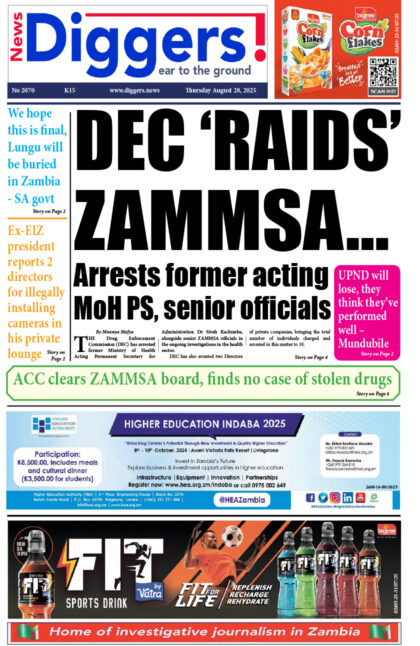Secretary to the Cabinet Roland Msiska says money laundering and terrorist financing activities have adverse implications on social security because they are capable of hurting the country’s investment opportunities.
And Dr Msiska says according to the the latest money laundering/terrorist financing national risk assessment report, money laundering risks in Zambia is medium high while terrorist financing risk is medium low.
At the launch of the money laundering/terrorist financing national risk assessment report recently, Dr Msiska observed that money laundering and terrorists financing could not contribute to economic growth but destabilise the financial sector and ultimately economic growth.
“As you may be aware, the National risk assessment report was approved by Cabinet on 14th August, 2017 and it provides a comprehensive detail covering the country’s status of money laundering and terrorist financing risks. Money laundering and terrorists financing and indeed other financial crimes have adverse social security implications. The proliferation of criminal activities that generates proceeds that can be laundered is one of them. But the most important harm is that of hurting the investment opportunities that can contribute to economic growth because of fear that successful money laundering and terrorist financing will destabilize the financial sector and ultimately the economy and its growth,” Dr Msiska said.
“Dealing with money laundering terrorist financing required a national response. Therefore, inter-agency national risk assessment of money laundering and terrorist financing was an important step to better understand the country’s vulnerabilities and to develop plans too deal with them. Indeed, identification, assessing and understanding of money laundering and terrorist financing risks are essential parts of the development and implementation of effective anti-money laundering/countering the financing of terrorism regime. The national risk assessment would assist in the prioritisation and efficient allocation of the resources by authorities and provide useful information to reporting entities to support the conduct of their own risk assessments.”
Dr Msiska expressed confidence that the recently launched anti-money laundering report had set the basis for government its stakeholders to address some challenges in the near future.
“In May 2015, government took a bold decision for the country to undertake a money laundering/terrorist financing national risk assessment. The national risk assessment which was coordinated by the financial intelligence center under the ambit of the anti-money laundering/ countering the financing of terrorism national task force of senior officials included participants from selected government ministries, law enforcement agencies, supervisory authorities, reporting entities, civil society organisations and the private sector. The report contains factual data from relevant government agencies and private sector and other contextual information about the anti-money laundering/countering the financing of the terrorism regime in Zambia. The report also highlights some significant information and data gaps, weaknesses in the systems process of government, data storage and record keeping and legislative and policy constraints that require our intervention,” he said.
“However, I am glad that this report has set the basis for the government and other stakeholders to address some of these challenges and weakness in the near future. I am delighted to see in the audience critical stakeholders in the fight against money laundering and terrorist financing. From the national risk assessment findings and I urge all of you to quickly make use of the information contained in this report and use it to develop the anti-money laundering/countering the financing of terrorism programmes in accordance with relevant legislation to fight money laundering, terrorism financing and all other financial crimes. You will note that the national risk assessment revealed that money laundering risks in Zambia is medium high while terrorist financing risk is medium low.”
However, Dr Msiska regretted that there were some deficiencies in the country’s legal framework despite having a comprehensive anti-money laundering/countering in the financing of terrorism.
“Although the country has comprehensive anti-money laundering/countering the financing of terrorism legal framework, the assessment also noted some deficiencies. These included ineffective monitoring of suspicious transactions activities, ineffective compliance functions in reporting entities, inadequate anti-money laundering/countering the financing of terrorism knowledge for both supervisory authorities and reporting entities especially for the designated non-financial businesses and professions and weak enforcement of administrative and criminal sanctions,” he lamented.
“Based on the findings of the assessment, Dr Msiska disclosed that “an action plan has been developed to assist both government and private sectors to prioritize their allocations of resources to mitigate money laundering and terrorist financing risks. Government is fully committed in supporting efforts to address money laundering and terrorist financing risks in the country and as government we will continue to provide an enabling environment for the stakeholders to effectively address the deficiencies identified during the national risk assessment. I therefore encourage everyone to use the national risk assessment report, inform yourself about the risk levels of the country and devised strategies to address the deficiencies.”
Dr Msiska called for the formation of joint investigating task forces for sharing and exchanging of information on anti-money laundering/countering the financing of terrorist matters.
“Government is cognate of the importance of cooperation in the fight against financial crimes. If we are to succeed as nation against these vices cooperation among different stakeholders in the anti-money laundering/countering the financing terrorism regime cannot be overemphasized. Therefore, there is need to combine efforts by different stakeholders in the fight against money laundering, terrorist financing and other financial crimes. This for example calls for formation of joint investigating task forces and sharing and exchanging of information on anti-money laundering/countering the financing of terrorist matters,” said Dr Msiska.
Dr Msiska also applauded the World Bank and the Eastern and Southern Africa Anti-money Laundering Group (ESAAMLG) for their assistance in the compiling of the anti-money laundering and countering the financing of terrorism mutual evaluation report.
























